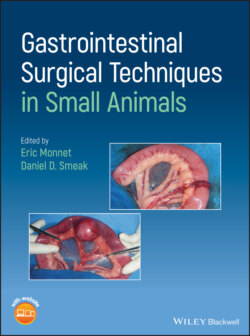Читать книгу Gastrointestinal Surgical Techniques in Small Animals - Группа авторов - Страница 24
1.3.8 Medications
ОглавлениеIn an experiment in rats, it was shown that the administration of methylprednisolone did not affect the mechanical strength of colonic anastomosis (Mastboom et al. 1991a). However, the effect of steroids on the healing of the gastrointestinal tract is controversial (Thornton and Barbul 1997; Thompson et al. 2006).
The administration of NSAIDs after gastrointestinal surgery is also very controversial (Mastboom et al. 1991b; Gorissen et al. 2012; Bhangu et al. 2014; Collaborative 2014). The non‐selective cyclo‐oxygenase inhibitors seem to increase the risk of leakage after colorectal surgery (Gorissen et al. 2012). Two meta‐analyses in human patients reported opposite results (Bhangu et al. 2014; Collaborative 2014). However, both of those studies have focused on colorectal surgery, which is not performed frequently in small animal surgery. In one of the studies, animal experiments were reviewed and showed that NSAID administration in the post‐post‐operative period increased the risk of leakage (Bhangu et al. 2014). The NSAIDs affect production of VEGF and angiogenesis. They also interfere with collagen formation and cross‐linking (Inan et al. 2006; Gorissen et al. 2012). After administration of NSAIDs, hydroxyproline concentration was significantly reduced after resection and anastomosis of the ileum. This effect was mostly present three days after surgery. Seven days after surgery, the concentration of hydroxyproline had risen again (Mastboom et al. 1991b). In a study on rats, NSAIDs increased the morbidity and mortality rates without necessarily leading to an increased risk of leakage (Mastboom et al. 1991b).
The chemotherapy drugs because of their immunosuppressant effect can negatively affect the healing of the gastrointestinal tract (Thornton and Barbul 1997).
